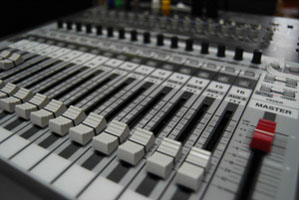
I have great respect for people with one of the most difficult jobs when it comes to live performance – the soundman/woman. (for ease of discussion I will refer to this person as the soundman). I have found most people in the audience do not know that the sound men control how the performance sounds in terms of volume and mix and don’t appreciate his role. I lost count of the times people have come up to me to say “great sound”, “I love your tone” or “its too loud” after I am performing. I always tell them that it isn’t me, the soundman is the one in control. I, as a performer, simply give the soundman the raw material with which he can work with. Thus I want to give the highest quality signal with which he can work with (one of the main reasons Sonic Nuance Electronics was started by me).
In terms of who on a performance “team” has the most influence over the overall sound, my opinion is that it is the soundman. With this in mind, it makes sense for the performer to look at the soundman as an ally and not an adversary in getting the music to the audience. I’ve heard of performers getting upset that “their tone” wasn’t coming through correctly, and I certainly understand the frustration. After all, many musicians spend countless hours trying to get a good tone out of their instrument. However, it is important to realize the soundman is trying to make the overall mix sound good, not just one instrument. To achieve this, the soundman has ultimate control of what the audience hears. For example, on a bass guitar channel the soundman can modify the equalization, volume, effects (reverb, compression, etc) and even mute it altogether. On top of that, the room acoustics come into play in a big way to modify the sound. With all this in mind, I feel it is more important that the overall mix sounds “even” and that the soundman and performer do whatever is necessary within reason (including changing tone) to make that happen. This will be much easier to achieve if the soundman and performer’s vision of the sound is consistent, so I suggest both the performers and soundmen discuss goals before a performance.
Let me explain the importance of this via an example. One Sunday at a church service I was playing bass guitar and the soundman came up to me afterwards asking “is there something wrong with your equipment?” I replied that I didn’t know of any issues and asked what he had heard or didn’t hear. He went on to explain that he was hearing a constant tone with no decay when I was tuning. We tried to debug this issue after the service and could not duplicate the phenomena. It wasn’t until hours later when he sent me the isolated bass track that everything made sense. To give some context, the soundman didn’t have a clear line of sight to all the musicians, especially to me. Also, he used our practice recordings for reference.
It turns out that when the soundman thought I was tuning I was actually performing using an ebow* – hence the long sustaining notes with “no decay”. After I understood what happened I explained it to the soundman and apologized for not informing him before hand what I was planning. You see, the soundman did his homework and I had not used the ebow effect at all during our rehearsal. Thus it was not on the rehearsal recording which he diligently studied. Also, using an ebow on bass is far from a normal thing a soundman would come across, he had no way of knowing (especially since he couldn’t see me) what I was doing. Thinking something was wrong with my equipment he muted the bass channel. I learned my lesson – communicate anything “out of the ordinary” before a performance with the soundman. This includes things like effects on the bass (a heavily distorted bass tone is usually not something a soundman expects, so he may think something is wrong), changing instruments during a set, etc.
The soundman has a hard enough job. So performers, try to help them via better communication and often the music will come out better than you imagined.
2015 Addendum: Mike Sessler at Church Tech Arts wrote a great companion piece to my article. It gives the opposite perspective of the tech guys helping the worship leader.
[button style=”btn-primary” url=”http://churchtecharts.org/home/2015/3/22/tech-guys-help-your-worship-leader” size=”” block=”false” target=”_self”] Read More [/button]
